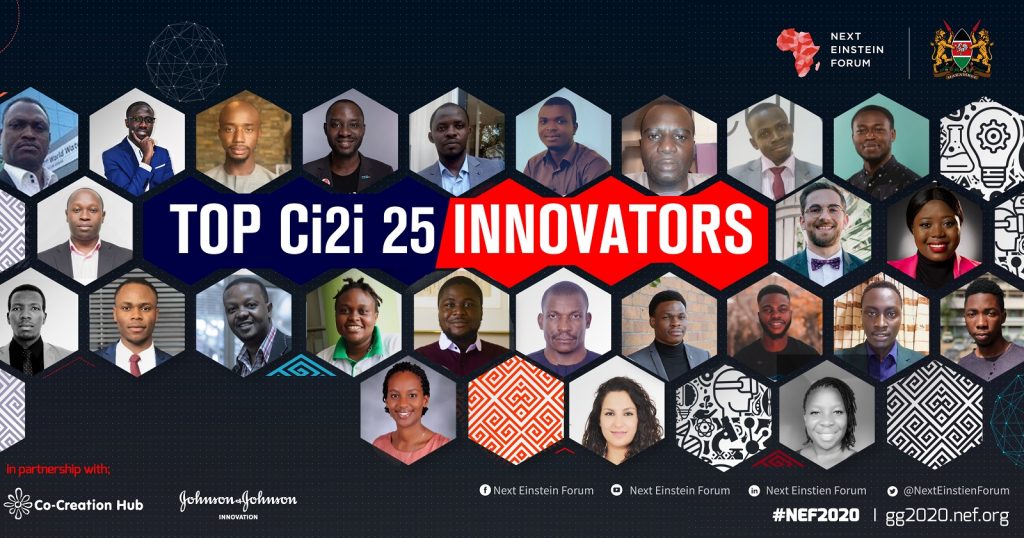The Next Einstein Forum (NEF) has announced the 25 finalists for its Challenge of Invention to Innovation (Ci2i) competition which will be held next Tuesday and Wednesday (10 and 11 March) in the NEF Innovation Salon in Nairobi.
In a statement last week the NEF said the third cohort of Ci2i finalists, selected from 260 applications, are ambitious African innovators developing scalable solutions to local challenges in agriculture, integration and logistics, personalised and precision health, power and energy.
No ad to show here.
They will pitch for a $25 000 prize in five categories but also be connected to investors in a one-of-a-kind “Sciencepreneur Investor Meetup”, said Next Einstein Forum managing director Nathalie Munyampenda in a statement last week.
The 25 finalists for the Next Einstein Forum’s Challenge of Invention to Innovation were selected from 260 applications
The 25 finalists selected, with the support of Lagos based Co-creation Hub, include the creators of a portable solar-powered solution against post-harvest milk losses, ophthalmic devices emerging as the world’s first definitive treatment of glaucoma and an online blood bank connecting hospitals.
The finalists will be treated to a lab-style bootcamp, held before the NEF Global Gathering 2020 in Nairobi starting next Tuesday.
The bootcamp will involve pitch preparation and investment readiness sessions. At the end of the bootcamp, the young sciencepreneurs will gain knowledge of how to create and deliver value through their solutions as well as understanding funding options & valuations.
Finalists were selected by reviewing potential for impact, technological readiness and the potential for commercialisation. The winners will be announced next Friday (13 March).
The finalists are:
Sadiq Temitayo (Nigeria): AirSynQ is an automated aerial surveillance system powered by balloon satellites, for monitoring oil and gas pipeline assets in a bid to curb oil theft and vandalism
Addae Obeng Benjamin (Ghana): Aleph Engineering is a hardware and software solutions for enhancing physiotherapy in children with cerebral palsy.
Moussa Thiam (Senegal): Caba is a real-time hydroclimatic risk monitoring system used to track and provide flood risk information to low-income communities.
Philippa Ngaju Makobore (Uganda): ECGF is an affordable electronically controlled gravity feed (ECGF) infusion set that regulates and delivers intravenous fluids or medication to patients.
Abraham Natukunda (Rwanda): Natukanda’s eNose is an analytics platform that increases tea processing procedures using low power sensor devices and a data analytics engine.
Albert Kure (Nigeria): FrontierSS is at the intersection of facilitating Stem education and the creation of education solutions.
Nzambi Matee (Kenya): Gjenge is an alternative building manufacturing company that recycles plastic waste.
Salma Bouggarani (Morocco): Green Watech is a patented, eco-innovative and efficient multi-soil layering (MSL) system for municipal wastewater treatment.
Oghenetega Iortim (Nigeria): GRICD is a rechargeable, trackable, mobile cold boxes that enables businesses store and transport temperature-sensitive commodities.
Chijo Bare (Nigeria): Hydrotriciton is a water-powered, emission free, generating set that utilizes water as an input fuel and through cost effective hydrogen gas production.
Ifeanyi Christopher Chukwurah (Nigeria) Ifymoto is an insect farming enterprise creating a protein-packed, cheap and high-quality alternative to the unsustainable livestock feed.
Melissa Bime (Cameroon): Infiuss is an online blood bank that connects hospitals with blood banks especially those that lack them.
Joshua Fisher (South Africa): Liqid Medical is an innovative and high impact ophthalmic devices that fight global blindness.
Percy Lemtukei (Kenya): MaziwaPlus Prechiller is a non-refrigerant mobile solar-powered milk chiller with a farmer management and milk collection platform.
Nsereko Mike (Uganda): Mini Money is a peer to peer mobile and blockchain technology that reduces Africa’s high cost of remittances from fees of 14% to 7% a transaction, and even further to two percent.
Menyo Innocent (Uganda): M-Scan is a portable affordable and power efficient ultrasound device that is compatible with laptops, tablets and cellphones.
Yankho Kaimila (Malawi): Nutrition Wellness Center is a centre for the prevention and management of overweight and obesity and dietary related diseases.
Abasifreke James (Nigeria): Poker is a blockchain development of innovative solutions for banks and fintech companies, including government security agencies.
Okey Esse (Nigeria): Powerstove Offgrid is an affordable smokeless clean cookstove that uses 70% less of biomass and cooks food 5 times quicker, saving households $300 annually.
Olubanjo Olugbenga (Nigeria): Reeddi sustainably provides clean, reliable and affordable electricity to individuals, households and businesses operating in energy-poor regions.
Fela Akinse (Nigeria): Salubata are modular and customisable shoes made from recycled plastic.
Abdou Maman (Niger): Tele Irrigation is a long-distance mobile, solar and IOT captor water distribution, real-time farm monitoring and data collection.
Achiri Arnold (Ghana): Traveler Inc is an information system app that detects accidents in real time and sends a distress signal to ambulances and authorities.
Adulai Barry (Guinea Bissau): Ubuntu2S has intelligent solar home system (SHS) kits and solar kiosks, developed with open solutions and mobile money payments.
Kolawole Oluwatomisin (Nigeria): Vinsighte is a digital health venture that aids the visually impaired to live more comfortably and achieve their full potentials.
Read more: Meet Next Einstein Forum’s 2019-2021 Fellows cohort
